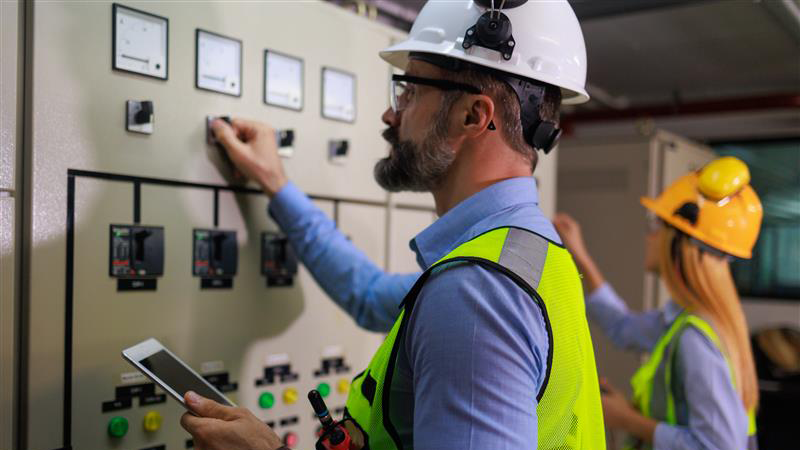In 2023, the National Fire Protection Association (NFPA) redefined the rules of electrical maintenance by elevating NFPA 70B from a recommended practice to an enforceable standard. This critical shift reshapes how facilities must approach electrical system upkeep, moving from optional guidelines to mandatory, condition-based maintenance. Non-compliance may carry serious consequences, including increased safety risks, operational downtime, and costly penalties. For facility owners, managers, and maintenance teams, understanding and implementing the new requirements isn’t just important; it’s essential. Staying ahead of these changes is the key to maintaining compliance, protecting your facility, and safeguarding your workforce.
What is NFPA 70B?
NFPA 70B, officially known as the Standard for Electrical Equipment Maintenance, outlines the requirements for establishing effective maintenance programs for electrical systems. The purpose of the standard is to help organizations reduce the risk of electrical failures, extend equipment life, and promote workplace safety. Through structured maintenance programs including condition-based testing, preventive care, and detailed recordkeeping, organizations can minimize unplanned outages and reduce the risk of hazards such as electrical fires and arc flash incidents. This is vital for industries where downtime is costly or dangerous, such as healthcare, data centers, manufacturing, and utilities.
The new standard requires organizations to establish and maintain formal, documented Electrical Maintenance Programs (EMPs). These programs must clearly outline maintenance procedures, testing methods, schedules, and responsibilities for accountability and consistency. The update emphasizes a risk-based approach, tailoring maintenance frequency to the criticality of equipment, providing essential assets with more frequent attention while optimizing resources for less critical systems. Predictive and preventive maintenance testing techniques such as infrared thermography, partial discharge analysis, and oil testing are highlighted to detect potential issues early and enable efficient maintenance planning. Medium- and high-voltage equipment face stricter maintenance and testing requirements due to their crucial role and associated fault risks.
What Non-Compliance Could Mean
Failing to comply with NFPA 70B can expose organizations to serious legal and operational consequences, as enforcement by regulatory authorities tightens. Ignoring the maintenance requirements often leads to missed inspections, deferred repairs, and accelerated equipment deterioration. This neglect increases the likelihood of unexpected failures, leading to costly downtime, expensive emergency repairs, and widespread business interruptions that disrupt productivity and reputation damage.
Non-compliance significantly raises liability risks, specifically if an electrical incident causes injury, property damage, or environmental harm. Insurance providers are increasingly demanding businesses to adhere to recognized industry standards. Failing to meet these expectations can result in denied claims, higher premiums, or even policy cancellations.
The most critical consequence of not complying with NFPA 70B is the threat to worker safety. Inadequate electrical maintenance significantly increases the chances of arc flashes, electrical shocks, fires, and other hazards that can cause serious injury or fatalities. These dangers not only violate workplace safety regulations but also affect employee well-being and morale, potentially causing workforce disruption. In addition, NFPA 70B requires that workers be properly trained and qualified to perform electrical maintenance safely, with the knowledge and skills needed to recognize hazards and follow the correct procedures to reduce risk.
During regulatory audits or inspections, organizations unable to demonstrate compliance may face hefty fines, legal citations, or operational restrictions that impede business continuity. Maintaining full compliance helps companies avoid penalties, fosters a strong culture of safety and accountability, and facilitates smoother, more successful audits. In addition to the benefits already discussed, NFPA 70B compliance can also strengthen an organization’s competitive edge in bids and contracts, improve strategic planning through detailed maintenance data, and boost employee retention by demonstrating a genuine commitment to safety. By adhering to NFPA 70B, organizations protect their workforce and infrastructure while creating safer workplaces, maintaining operational continuity, and securing lasting business strength.
How HVM Supports NFPA Compliance
High Voltage Maintenance (HVM) is a trusted leader in electrical testing and maintenance services, offering solutions specifically designed to align with NFPA 70B standards. We assist clients in developing or enhancing their Electrical Maintenance Programs (EMPs), helping them adopt a condition-based maintenance approach that improves system reliability, reduces risk, and supports long-term compliance.
Our services include the creation of formal governing policies, conducting detailed site audits that evaluate existing practices against the standard’s requirements, and developing condition-based Electrical Maintenance Programs (EMPs) tailored to the unique needs of each facility. We also offer a NFPA 70B electrical maintenance training course designed to educate internal teams on the standard, program responsibilities, and best practices for implementation.
With thorough documentation, expert guidance, and ongoing support, HVM helps make sure organizations remain current with updates and maintain alignment with evolving industry expectations.
Ready to take the next step toward NFPA 70B compliance?
Watch our on-demand NFPA 70B webinar. For questions or to get started, contact us directly.


